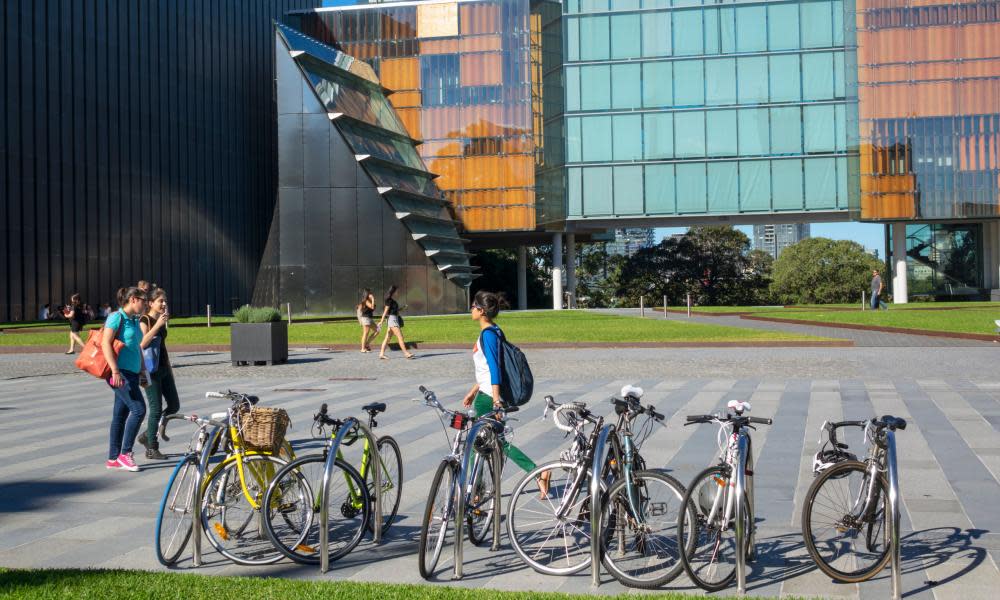Almost half of Australian PhD students considering disengaging from studies due to pandemic

The economic impact of Covid-19 is threatening to empty out Australia’s talent pool of researchers, with 45% of current PhD candidates considering disengaging from their studies due to the financial pressure of the pandemic.
Five per cent of PhD students are currently or about to experience homelessness and 11% are skipping meals, according to a new study from the University of Sydney.
Fifty-three per cent of the 1,020 students surveyed had their employment negatively affected by the pandemic, 75% said they expected to experience financial hardship, and almost a fifth said they were already, or anticipated being, unable to pay bills or buy medicines.
Related: Australia to allow international university students to return before all state borders open
The study’s lead author, Rebecca Johnson, from the University of Sydney’s faculty of science, said that this had the potential of “gentrifying” university degrees and locking out students from lower socio-economic backgrounds.
“The people we are hoping to become the next generation of researchers, the people we want to develop a vaccine, to remodel the economy, rebuild our infrastructure and social services after the pandemic, they are the ones right now that can barely [buy] enough food to eat, or put a roof over [their] heads,” she told Guardian Australia.
The study, submitted to the journal Research in Higher Education – but not yet peer-reviewed – collected survey responses from 1,020 current PhD students from the University of Sydney in April this year.
Forty-five per cent of students said they expected to “disengage” from their studies – which includes taking extended leave, suspending a PhD, or dropping out entirely – within the next six months.
This was significantly higher than an average disengagement rate of 20% over the four years from 2010-14, compiled in 2017 by the Department of Education, Skills and Training.
The April 2020 disengagement figures were similar for both arts-based and science-based students.
Johnson said that “disengagement” did not necessarily mean students would drop out, but that the statistics were cause for alarm.
“Pretty much nobody goes from full-blown research to dropping out,” she said. “I’m not saying 45% are going to drop out. But a lot of them will not come back. It is a warning, not a prediction.”
She added that this was “exacerbated” by the fact that university staff are excluded from the government’s jobkeeper emergency payment.
The 1,020 students surveyed represent approximately 24% of the total research student cohort of Sydney University, and were drawn from across faculties.
Johnson said it was especially worrying to see the homelessness statistics.
“We will potentially see the gentrification of the PhD,” she said. “Back to the old, old days, when the wealthy people got PhDs and people of lower socio-economic status just dropped out.
“We have already seen that academic papers submitted by women have dropped during Covid-19,” she said.
Related: Coalition's university fee overhaul accused of being an 'attack on women'
For the study, 1,020 University of Sydney students provided their ID numbers for verification. The authors said that respondents were self-selecting and “broadly demographically representative, incorporating 300 international and 713 domestic students, as well as 843 full-time and 177 part-time students”.
“We honestly didn’t expect it to get that kind of response,” Johnson said. “We were watching it come in, and we felt we’ve really hit on a nerve here.”
Johnson, who herself is a PhD student, said her colleagues were commonly under financial stress, but it was rarely discussed.
“That’s why in the paper, we called it ‘The quiet crisis’,” she said. “We don’t really talk about this. If a research student is asked to do some extra teaching hours, or a few extra hours for an experiment, even if they are not being paid very much, they are not going to say anything. It has been built into the system for such a long time.”
“Fifty-seven per cent of all research groups in Australian universities are staffed by PhD students. If we took away 20% of that, that is a huge dent on the labour that goes into our research group. They are logging the data, trudging out into the field, collecting interviews. Doing that gladly because they are passionate about that field.
“It’s the result of a structure that was built a couple of hundred years ago and needs to be updated.”

 Yahoo News
Yahoo News 
